
Holger Börner was a German politician of the SPD.

The 2004 Saxony state election was held on 19 September 2004 to elect the members of the 4th Landtag of Saxony. The incumbent Christian Democratic Union (CDU) government led by Minister-President Georg Milbradt lost its majority. The CDU subsequently formed a grand coalition with the Social Democratic Party (SPD), and Milbradt was re-elected as Minister-President.
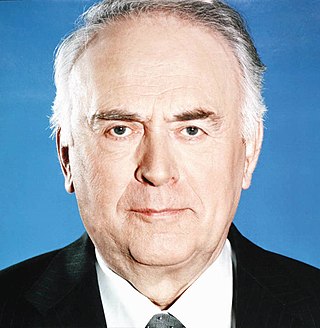
The 2002 Saxony-Anhalt state election was held on 21 April 2002 to elect the members of the 4th Landtag of Saxony-Anhalt. The incumbent Social Democratic Party (SPD) minority government led by Minister-President Reinhard Höppner was defeated. The SPD fell to third place, while the Christian Democratic Union (CDU) moved into first. The CDU subsequently formed a coalition with the Free Democratic Party (FDP), and CDU leader Wolfgang Böhmer was elected Minister-President.

The 2005 North Rhine-Westphalia state election was held on 22 May 2005 to elect the 14th Landtag of North Rhine-Westphalia. The outgoing government was a coalition of the Social Democratic Party (SPD) and The Greens led by Minister-President Peer Steinbrück.

The 2008 Hessian state election was held on 27 January 2008 to elect the members of the Landtag of Hesse. The incumbent Christian Democratic Union (CDU) government led by Minister-President Roland Koch lost its majority. The result of the election was extremely close but inconclusive, with the CDU winning just 3,500 votes (0.1%) more than the Social Democratic Party (SPD). Due to the entrance of The Left to the Landtag, neither the CDU–FDP or SPD–Green bloc garnered a majority. After a year of failed attempts to form government, a new election was held.
The politics of Hesse takes place within a framework of a federal parliamentary representative democratic republic, where the Federal Government of Germany exercises sovereign rights with certain powers reserved to the states of Germany including Hesse. The state has a multi-party system where, as in most other states of former Western Germany and the federal level, the three main parties are the centre-right Christian Democratic Union (CDU), the far-right Alternative for Germany (AfD), and the centre-left Social Democratic Party of Germany (SPD).

The Landtag of Hesse is the unicameral parliament of the State of Hesse in the Federal Republic of Germany. It convenes in the Stadtschloss in Wiesbaden. As a legislature it is responsible for passing laws at the state level and enacting the budget. Its most important function is to elect and control the state government. The constitution of the State of Hesse describes the role of the Landtag in sections 75 to 99.
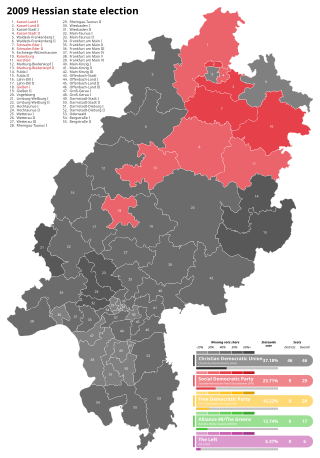
The 2009 Hessian state election was held on 18 January 2009 to elect the members of the Landtag of Hesse. The election was called after the failure of all government formation attempts conducted after the 2008 state election held a year earlier. The Social Democratic Party (SPD) suffered major losses, falling from an effective tie with the Christian Democratic Union (CDU) to a 13.5-point deficit. The Free Democratic Party (FDP) and The Greens were the primary beneficiaries of the SPD's decline. After the election, the CDU formed a coalition government with the FDP, and Roland Koch was elected Minister-President.

The 1995 North Rhine-Westphalia state election was held on 14 May 1995 to elect the 12th Landtag of North Rhine-Westphalia. The outgoing government was a majority of the Social Democratic Party (SPD), led by Minister-President Johannes Rau.

The 2016 Baden-Württemberg state election was held on 13 March 2016 to elect the members of the 15th Landtag of Baden-Württemberg. The incumbent government of The Greens and the Social Democratic Party (SPD) led by Minister-President Winfried Kretschmann lost its majority.

The 2017 Lower Saxony state election was held on 15 October 2017 to elect the 18th Landtag of Lower Saxony. The incumbent coalition government of the Social Democratic Party (SPD) and The Greens led by Minister-President Stephan Weil was defeated. Though the SPD became the largest party in the Landtag largely fueled by the personal popularity of Weil, their gains were offset by losses for the Greens, depriving the government of its majority. The SPD subsequently formed a grand coalition with the Christian Democratic Union (CDU), and Weil continued as Minister-President.

The 2018 Hessian state election was held on 28 October 2018 to elect the members of the Landtag of Hesse. The outgoing government was a coalition of the Christian Democratic Union (CDU) and The Greens led by Minister-President Volker Bouffier.

The 1995 Hessian state election was held on 19 February 1995 to elect the members of the 14th Landtag of Hesse. The outgoing government was a coalition of the Social Democratic Party (SPD) and The Greens led by Minister-President Hans Eichel.
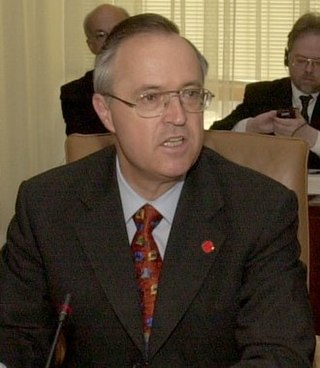
The 1991 Hessian state election was held on 20 January 1991 to elect the members of the 13th Landtag of Hesse. The outgoing government was a coalition of the Christian Democratic Union (CDU) and Free Democratic Party (FDP) led by Minister-President Walter Wallmann.
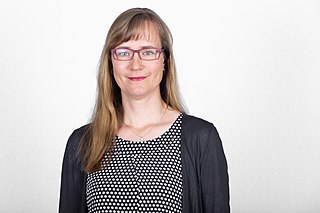
The 2021 Saxony-Anhalt state election was held on 6 June 2021 to elect the 8th Landtag of Saxony-Anhalt. The outgoing government was coalition of the Christian Democratic Union (CDU), Social Democratic Party (SPD), and The Greens, led by Minister-President Reiner Haseloff.
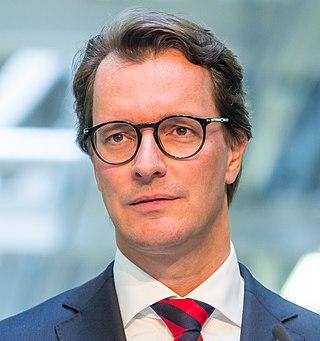
The 2022 North Rhine-Westphalia state election was held on 15 May 2022 to elect the 18th Landtag of North Rhine-Westphalia. The outgoing government was a coalition of the Christian Democratic Union (CDU) and Free Democratic Party (FDP) led by Minister-President Hendrik Wüst.

The 2022 Lower Saxony state election was held on 9 October 2022 to elect the 19th Landtag of Lower Saxony. The incumbent government was a coalition of the Social Democratic Party of Germany (SPD) and Christian Democratic Union of Germany (CDU) led by Minister-President Stephan Weil.

The Third Bouffier cabinet was the state government of Hesse between 2019 and 2022, sworn in on 18 January 2019 after Volker Bouffier was elected as Minister-President of Hesse by the members of the Landtag of Hesse. It was the 22nd Cabinet of Hesse.
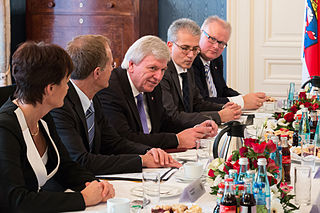
The Second Bouffier cabinet was the state government of Hesse between 2014 and 2019, sworn in on 18 January 2014 after Volker Bouffier was elected as Minister-President of Hesse by the members of the Landtag of Hesse. It was the 21st Cabinet of Hesse.

The 2023 Hessian state elections was held on Sunday October 8, to elect the 21st Landtag of Hesse. The outgoing government was a coalition of the Christian Democratic Union and The Greens, led by Minister-President Boris Rhein of the CDU. The 2023 Bavarian state election was held the same day.





















